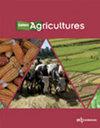Co-producing knowledge with family farming organizations: a citizen science observatory in Santarém, Brazilian Amazon
IF 1.1
4区 农林科学
Q3 AGRICULTURE, MULTIDISCIPLINARY
引用次数: 2
Abstract
This data paper presents a survey conducted in a participatory manner in the territory of Santarém, in the Brazilian Amazon. The aim is to understand how global changes are affecting family farmers. In the study area, family farming has been confronted over the past 20 years with the rapid expansion of large-scale monocultures, especially soybean. As part of the Odyssea socio-environmental observatory, academic researchers and family farming organizations entered into a partnership to co-produce data that could be strategically useful for these organizations. A process of co-construction of the expectations allowed priorities to be established and the data collection strategy to be defined. Three levels of analysis were chosen in order to allow an integrated understanding of the dynamics of change: the Santarem Plateau territory, the rural community level (living place recognized by the farmers) and the farmers’ households. Twenty-one farmers, called community researchers, organized in 3 teams, applied a questionnaire through the KoboCollect smartphone application to 544 families in the municipalities of Santarém, Mojuí dos Campos and Belterra. Meetings were previously held in the rural communities and questionnaires were applied with representatives of 32 communities. Data was collected between April and June 2019. The community researchers and academic researchers then came together for two collective sessions of data analysis and interpretation in July and October 2019. Data was standardized and cleaned using SPSS software, between September and December 2019. The metadata and databases are available on the CIRAD dataverse.与家庭农业组织共同生产知识:巴西亚马逊地区santarsamim的公民科学观测站
本数据文件介绍了在巴西亚马逊地区santarsamim境内以参与式方式进行的一项调查。目的是了解全球变化是如何影响家庭农民的。在研究区,家庭农业在过去20年中面临着大规模单一栽培的迅速扩张,特别是大豆。作为奥德海社会环境观察站的一部分,学术研究人员和家庭农业组织建立了合作伙伴关系,共同生产对这些组织可能具有战略意义的数据。共同构建期望的过程可以确定优先次序,并确定数据收集战略。为了综合理解变化的动态,选择了三个层次的分析:Santarem高原地区、农村社区水平(农民认可的居住场所)和农民家庭。21名被称为社区研究人员的农民分成3个小组,通过KoboCollect智能手机应用程序向圣塔姆、Mojuí dos Campos和贝尔特拉市的544个家庭填写了问卷。以前曾在农村社区举行会议,并向32个社区的代表发放了调查表。数据收集于2019年4月至6月。2019年7月和10月,社区研究人员和学术研究人员聚集在一起,进行了两次数据分析和解释的集体会议。在2019年9月至12月期间,使用SPSS软件对数据进行标准化和清理。元数据和数据库可以在CIRAD数据库上使用。
本文章由计算机程序翻译,如有差异,请以英文原文为准。
求助全文
约1分钟内获得全文
求助全文
来源期刊

Cahiers Agricultures
农林科学-农业综合
CiteScore
2.00
自引率
22.20%
发文量
23
审稿时长
3 months
期刊介绍:
Cahiers Agricultures is a - mainly - French language scientific journal on world farming systems, how they are changing and their role in society. It is aimed at all those – researchers, field workers, teachers – who are interested in a holistic reflection on the agricultural world.
Cahiers Agricultures gives priority to research on agriculture as implemented by farmers, that has meaning for citizens in countries in the North and South, as opposed to research work conducted in a controlled environment (laboratory, research center, etc.). Research of this type is often multidisciplinary and takes into account the knowledge and know-how of the different stakeholders. The different parties are also actively involved in research, alongside the scientists. In this way, the journal stimulates debate on issues linked to society, such as the impact of using water and nitrogen fertilisers, peri-urban farming, fish farming, livestock production in rural areas, food security, etc.
 求助内容:
求助内容: 应助结果提醒方式:
应助结果提醒方式:


